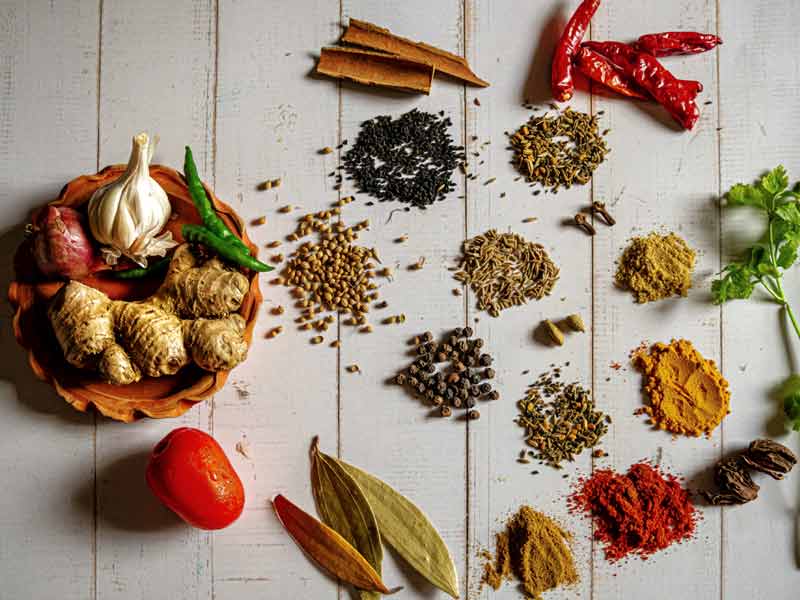
India is the land of spices. From turmeric and pepper to cinnamon, the country is home to many indigenous spices. So famous is this country for its spices that for ages, traders from Arabia, Rome, and then England, Portugal, and France came to India to trade in this commodity and made loads of money. Quite understandably, Indian cooking is incomplete without them. Every spice has its distinct taste and aroma and overdoing or undergoing them in a dish can completely butcher the preparation. However, beyond taste, spices are also packed with several health-benefiting properties. And to know what they are, Onlymyhealth spoke to Rakshita Mehra, who is a nutritionist and the founder of Nutrishala.
Table of Content:-
Common Spices And Their Nutritional Value
Spices are common in daily cooking in India. Here are some of the health-benefiting properties they come with:
Turmeric (Haldi)

(Photo Credit: Freepik)
This spice is generally added in every curry preparation. Its health benefits include:
- It has antiviral properties.
- It is antimicrobial
- It is anti-inflammatory in nature
- It’s even anti-carcinogenic, i.e. it can play a role in preventing cancer.
- Most importantly, turmeric contains curcumin, which is a bioactive compound. However, it needs another compound for the body to absorb it. And that compound is piperine, which is found in pepper. That’s why while preparing turmeric milk, add a pinch of pepper too.
- Turmeric is also believed to promote sleep. That’s the reason why it is generally recommended to drink turmeric milk before going to bed.
- Apart from adding to your curry and drinking turmeric milk, you can also have ginger-turmeric tea and turmeric latte.
Pepper (Kali Mirch)
This is again a widely used spice in Indian kitchens.
- As you already know, pepper has a great combination with curcumin (found in turmeric).
- It also has digestive properties, that is it helps with acidity.
- You can add it to your food preparations such as biryani, pulav, etc.
Cinnamon (Dalchini)

(Photo Credit: Freepik)
It is generally added in masala (spice) tea, pulav and curries.
- Cinnamon is generally recommended for diabetics. It has a compound called cinnamaldehyde, which has medicinal properties, and has an association with blood sugar level. Cinnamon keeps the blood sugar levels in check and prevents it from spiking.
- It also helps with polycystic ovary syndrome (PCOS). Hence, those suffering from this ailment can have cinnamon water first thing in the morning.
- However, overdoing anything can be harmful. Just a 1 cm stick or ¼ teaspoon of cinnamon a day is enough.
- You can have cinnamon water, add the spice to your food preparations, or add to tea or kadha (decoction).
Fenugreek Seeds (Methi)

(Photo Credit: Freepik)
Many people drink a glass of fenugreek, or methi, water first thing in the morning.
- It is generally recommended for diabetics as it keeps the blood sugar level in check.
- Methi is also believed to help with PCOS.
- Even those not suffering from these ailments can have methi water in the morning, given they can handle the spice taste.
- If you are consuming it as seeds, just half a teaspoon is enough in a day.
Basil (Tulsi)

(Photo Credit: Freepik)
Tulsi is highly revered in India. That’s why it is found in almost every Indian home.
- It boosts immunity
- It has antibacterial properties
- It is antimicrobial in nature.
- You can eat it raw, or add 1-2 tulsi leaves in your tea or kadha.
Ginger (Adrak)

(Photo Credit: Freepik)
It is used in tea, as well as in curries.
- It has digestive properties.
- It relieves inflammation, which is the root cause of several health issues.
- While suffering from a cold, having ginger is widely recommended.
- Just 1 gram of ginger in a day is enough.
- You can add ginger to your tea, curries, or have ginger-turmeric tea, which will also give you the benefits of turmeric.
Garlic (Lehsun)

(Photo Credit: Freepik)
This spice is widely used in Indian curries.
- It has a compound called allicin, which is good for your health.
- It also contains sulfur compounds.
- Garlic also has immunity-boosting properties.
- It has also been linked to managing blood pressure. However, garlic alone cannot keep your blood pressure in check.
Also read: This Leaf, Extensively Used In Indian Cuisine As A Spice, Has Medicinal Properties. Know What Is It
Other than these, other spices such as cardamom (elaichi), fennel seeds (sauf), ajwain, and asafoetida (hing) are known for their digestive properties. They help with acidity, constipation and bloating.
Although no one spice has all the nutritional properties, when asked which spice she would recommend, Rakshita said “turmeric”. She also recommends ginger and garlic, as Indians love their taste, and you get the pleasure of taste, as well as their health-benefiting properties, when you eat these two spices.
You must include some amount of spices in your diet. However, the extreme of anything is bad, hence you should never overdo them. You don’t need to drink turmeric milk in the morning, then add the spice to your lunch, have ginger-turmeric tea in the evening, and then again drink turmeric milk before going to bed. Just have one type of spice in a meal, and a gram of them in a day is enough.
(With inputs from Rakshita Mehra, who is a nutritionist and the founder of Nutrishala)
Photo Credit: Unsplash
Also watch this video
How we keep this article up to date:
We work with experts and keep a close eye on the latest in health and wellness. Whenever there is a new research or helpful information, we update our articles with accurate and useful advice.
Current Version